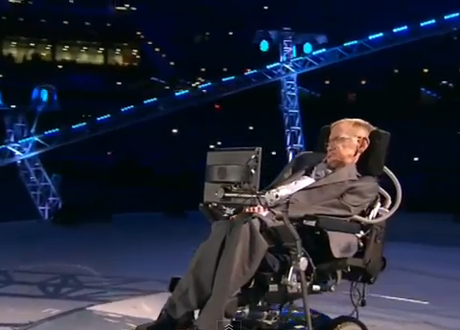 Stephen Hawking at the Paralympics. Channel 4
Stephen Hawking at the Paralympics. Channel 4
The background
The London 2012 Paralympics opened last night, with Professor Stephen Hawking as the guide. He asked the audience to “look up at the stars,” and to ponder why the universe exists. 62,000 were watching in the stadium. Dancers floated in on umbrellas; Baroness Grey-Thompson floated in on a golden wheelchair. Joe Townsend, the former Royal Marine who lost both his legs in Afghanistan, carried the Paralympic torch into the stadium from a zip wire that stretched from the ArcelorMittal Orbit tower. The ceremony was directed by Bradley Hemmings and Jenny Sealey.
141 disabled performers took part, with Nicola Mile-Wildin as Miranda in The Tempest, and Ian McEllan as Prospero. In the stadium were Sir Isaac Newton’s apple, a copy of the Universal Declaration of Human Rights, and a ball of energy representing the Higgs boson. The Queen was serenaded in by a rendition of Benjamin Britten’s National Anthem. Commentators are saying that whilst the ceremony itself might have been a little big ragged at times, it was still a wonderful exploration of ideas, and will with any luck alter perceptions of disability for the greater good of society.
Co-artistic director Jenny Sealey said: “I want people to see a great show and come out saying: ‘Bloody hell, I never knew there were so many disabled people.’ This is our chance not to be hidden any more,” quoted on The Guardian.
Chaotic, but smashing through glass ceilings
Past Paralympics opening ceremonies, said Jim White in The Telegraph, have been “earnest, insipid affairs.” But not this one. This was “three hours of noisy, colourful, bolshie brouhaha.” Nobody could accuse if “of being po-faced. At times chaotic … a little jumbled … occasionally resembling a giant prog rock gig.” It had a wider remit than Danny Boyle’s opening ceremony – to “point out that the limits of endeavour are merely territory as yet unexplored.” And The Tempest was, again, perfectly apt: “O brave new world that has such people in’t!” – as over the next few days we’ll see “all sorts of brave new sports.” And the most symbolic moment was Sir Ian McKellen as Prospero encouraing Miranda “to fly upwards and smash through a glass ceiling.”
Redefining bravery
Indeed, agreed Simon Barnes in The Times, we shall have to rethink what the word “brave” means, since “bravery is nothing more than the basic entry level requirement.” If you want “inspiration, it was there in the hello-mum smiles and waves” of the paralympic athletes. We’re “celebrating disabled people for doing what comes naturally to us all; spilling their guts in pursuit of victory.”
Changing perceptions
Charlotte Higgins on The Guardian said that the ceremony “lacked the gleeful anarchy of Danny Boyle’s” and certainly didn’t have the same budget. But it did have “its share of astonishing moments, and a real intelligence that powered it through some of its less successful sections.” This was “a ceremony of ideas.” Linking enlightenment to the hope of lifting prejudice against disabled people and the rush of knowledge was a brilliant idea, embodied perfectly in Stephen Hawking. Thankfully, there were no cliches about triumphing against adversity. Looking was a central theme – if we change our perceptions, we have a lot to gain. And “what a lot there was to look at” – umbrellas, a vast orrerry, umbrellas, acrobats. And now the Paralympics have returned home – and there’s “every sign that they will change perceptions of the rights and roles of disabled people in our national life.”
What a night! What an atmosphere! Come on London – let’s keep up the excitement for the next 11 days.
#paralympics— Boris Johnson (@MayorofLondon) August 29, 2012
A victory, despite not winning anything – yet
It was a relief, said Tom Sutcliffe in The Independent, to find that the ceremony had a “universal theme.” The ceremony, though, was a “a little ragged and thin at times, as if it couldn’t quite fill that vast space.” The “clarity of the message began to blur a little, so that it was almost a relief when the national anthem started up.” And even the athletes’ file-past was undeniably moving.” Though nothing’s “yet been won by these competitors,” it still feels “like a victory even so.”

